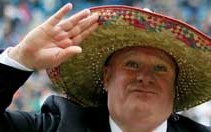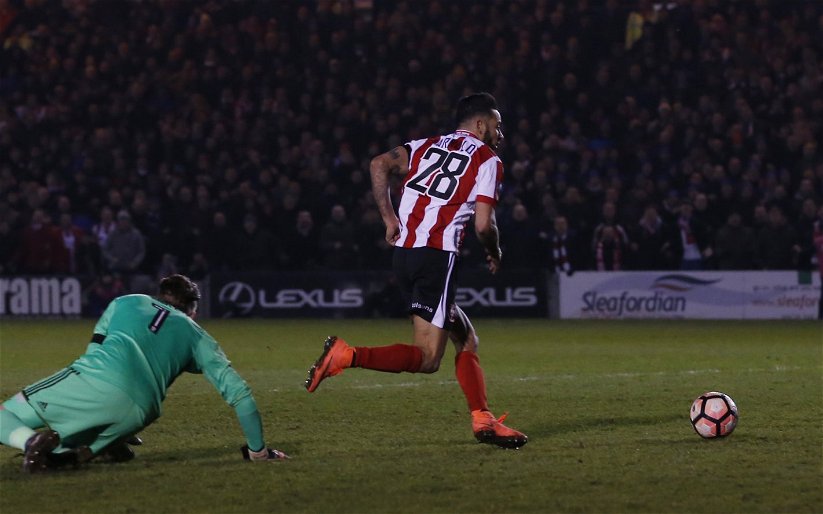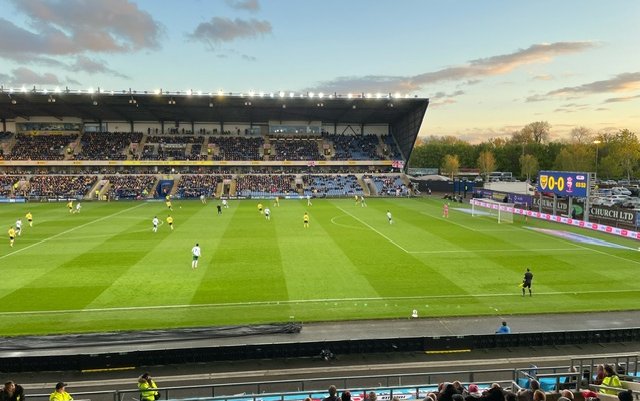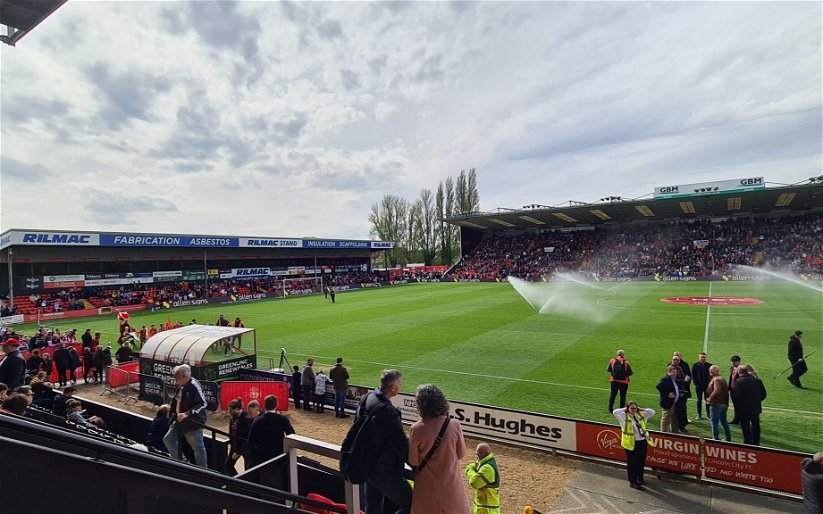Where do we begin with Steve Evans? The controversial Glaswegian is well known to Lincolnshire football fans, having spent 14 of his 25 years in management in the county at different levels. Given his chequered record on and off the field, it is no easy task to establish exactly how effective he is as a manager. The hard black and white facts shown below demonstrate a very impressive return in terms of points per game and promotions earned, especially considering the longevity of his managerial career, but many supporters will point to the allegations of cheating that have dogged his colourful journey through football’s lower echelons.
There was nothing in Steve Evans’ career as a player to suggest he would become a successful manager. Released by Bolton at the age of 16 in the summer of 1979, striker Evans decided to remain in his native Cambuslang and signed for his local club Clyde under future Scotland manager Craig Brown. It was not a successful period, being relegated from Division One (second tier of three) at the end of his first season and finishing seventh from bottom of the Scottish League in season two. He moved on to fellow strugglers Albion Rovers in the close season of 1981, and finished fourth from bottom, fifth from bottom, and bottom in his three seasons at Cliftonhill, although his scoring record of 28 in 76 games represents a reasonable return in a poor side. He then had one season playing for Ayr United alongside a young Alan McInally, and helped them to a mid-table finish in Division One before spending a very short period with Hamilton Academical. He signed for Division Two side St Johnstone – just relegated from Division One – in the summer of 1985 but had only one season before a serious cruciate knee ligament injury ended his career at the age of 23.
Evans found employment outside of football, and was an account manager with Budweiser and living in South Lincolnshire when the opportunity to coach and manage in junior non-league football arose. Responding to an advert for the manager’s job at Peterborough League side Gedney Hill, Evans was appointed player-manager and was sent off in his first game two minutes after coming on as a substitute. Some may say that set the tone for what happened next.
He was at Gedney Hill for no more than six months when Holbeach United came calling. Evans immediately took most of his players with him, provoking Gedney Hill into making a formal complaint – they were left with very few players mid-season, and could have folded had the exodus continued. After eighteen months of relative mediocrity at Holbeach, and after a strange spell as chairman of Corby Town, Evans made the switch to fellow United Counties Premier League club Stamford where his career as a manager got under way in earnest. The signings of top former professionals David Speedie, Micky Gynn, Trevor Quow and even a certain Daley Thompson helped the Daniels to two successive UCL championships and promotion to the Southern League in 1998. He also lifted the Lincolnshire Senior Cup that season – a competition viewed as an inconvenience by the professional clubs, but still no mean feat for a UCL side. Just three months into the 1998-99 season, Evans made a move across Lincolnshire to the club where he would make his name in a whole host of ways: Boston United.
The record books show that Boston rose from the Southern Premier League to the Football League in four seasons under Evans, a superb achievement. What the record books do not necessarily show is how that was achieved, and this is where the grey area begins to cast its shadow. Promotion to the Conference was achieved in his second season at York Street, and promotion to the Football League two years after that. Plaudits were widespread for what he had achieved: Boston United had long been seen as a sleeping giant in non-league football, and many observers felt the club had taken its rightful place in the League at last.
With their place in the Football League apparently secured, a storm broke over the club in relation to investigations by the Football Association into player contract irregularities. The focus is often placed on that promotion to the Football League, but the investigations by the FA and the subsequent criminal investigation covered the period 1998-2002 – the exact period of Evans’ tenure at York Street – and therefore included the Southern Premier League championship win in 2000. With the FA investigation under way, Evans was suspended by Boston on 4 July 2002.
The process had involved agreeing one contract with the player and registering a different contract with the FA, thereby enabling Boston to top up the player’s wages by referring to payments as expenses. One such example was the contract awarded to striker Ken Charlery, who was nominally paid £120 per week but received £620 in total; Charlery also received a signing-on fee of £16,000; neither the Football League nor the taxman ever saw this second contract. Former Liverpool defender Mike Marsh was contracted for £100 per week, but was actually earning £1,000. There was an obvious corollary to the payment of income tax, of which more later.
On 19 July Boston were found guilty of registering false contracts, and the football world awaited their demotion back to the Conference or worse, and the promotion of Dagenham & Redbridge in their place. To everyone’s eternal surprise, the Football Association decided to fine Boston £100,000 and impose a four-point deduction for their first season in the Football League. Dagenham manager Garry Hill called the decision ‘laughable’ and accused the FA of allowing Boston to cheat. A legal challenge by Dagenham came to nothing, and Boston were promoted. Perhaps cheats can prosper.
Evans did not get away so lightly. Having originally admitted four breaches of FA rules in July, on 23 December the FA found him also guilty of two charges of impeding the investigation; former Boston chairman Pat Malkinson, who had resigned when the scandal broke, was also found guilty of impeding the investigation and authorising illegal contracts. The charge of impeding the investigation related to the facilitation of a payment of £8,000 to a witness in an attempt to mislead, impede and frustrate the FA. Evans was initially bullish, openly challenging the FA and vowing to appeal the verdict. In January 2003 he was banned from the game for 20 months and fined £8,000; Malkinson was banned for 13 months and fined £5,250. That should have been the end of Steve Evans’ career in football, but it was not to rest.
Evans found work with one of a number of business management and recruitment companies owned by a certain Jonathan Sotnick, soon to become a director at Boston United. Once his 20-month ban had been served, Evans was re-appointed by Boston at the end of February 2004. Many Boston fans were not supportive of the move, but the club had endured two mediocre seasons in the Third Division and Evans was accepted back. A third mediocre season followed, as Boston struggled to overcome the long-term impact of the original £100,000 fine.
The scandal had not gone away for Evans either, as a criminal investigation into tax evasion at Boston United was launched. In September 2005, Evans appeared at Southwark Crown Court on fraud charges alongside Malkinson, general manager John Blackwell, director Brian James, and former club accountant Ian Lee. Further details emerged during the trial of how the club operated between 1997 and 2002; Ken Charlery spoke of bundles of cash in an envelope. It was revealed that Boston avoided a total of £323,000 in taxes during the period which enabled the club to attract players it could not otherwise have afforded. The court was told that the fraud gave Boston an undoubted edge over its competitors and transformed the club. As the evidence mounted against them, Malkinson and Evans pleaded guilty to one count of conspiring to cheat the public revenue. Malkinson received a two-year sentence, suspended for two years, and was ordered to repay the money plus £100,000 in interest; following an impassioned plea from his defence team in which they claimed Evans was terrified of spending even one day in prison, Evans was given a one-year sentence, suspended for two years. Blackwell, Lee and James were all cleared of conspiracy to defraud.
To the anger of the Boston fans, new chairman Jim Rodwell allowed Evans to keep his job, claiming that Evans had been working under ‘incredibly difficult circumstances’. Those circumstances were set to become even more difficult as Boston headed for relegation to the Conference in 2007 after five undistinguished seasons in the League. Evans showed his gratitude by resigning on 27 May despite pledging his loyalty to the club just three weeks earlier.
During his time at Boston, Evans’ off-field brushes with authority were too frequently mirrored by clashes on it. In November 2005 he received a suspended £1,000 fine after admitting using insulting or abusive words towards a match official. Just three months later he was escorted from Blundell Park at half-time by Humberside Police after abusing the fourth official, and warned for using foul and abusive language. In a hilarious postscript, the then-Boston chairman Jon Sotnick (remember him?) claimed Evans was being victimised and had been left outside Blundell Park with no mobile phone, no money, and was left to fend for himself. The police were not impressed and sent a report to the FA. In October 2006 he was sent from the dugout after an incident with Wycombe midfielder Tommy Doherty. If Evans was being victimised, they were making a damned good job of it.
Two days after leaving Boston, Evans was named manager of Conference side Crawley, who had big Football League ambitions. Backing their new manager with an increasingly large budget for such a small club, it actually took four years to take the Sussex club to the Football League. After three relatively ordinary seasons, 2010-11 will be remembered not only for a Conference record 105 points, but also for their run to the fifth round of the FA Cup and a lucrative tie at Manchester United. Evans had taken a club into the League for the second time, and this time it was completely legitimate.
On the negative side, his touchline behaviour continued to cause headlines. In his first season at Crawley he was sent from the dugout six times. He received a four-game ban for the first two, but was hauled before the FA to explain the other four, which came within an astonishing seven-game period. For those offences he was handed a suspended ban for the start of the following season. He appealed the four-game ban and had it reduced to two games, then decided to appeal the suspended ban; the FA was having none of it and increased the ban to an immediate ten games plus a further ten suspended. Furthermore, he was to have no contact with his players for two-and-a-half hours before games, at half time and for ninety minutes afterwards.
Crawley continued their good run into the Football League and were heading for a second successive promotion when Evans departed for League Two rivals Rotherham with six games of the season remaining. Controversy followed him north when he received a six-game ban and a £3,000 fine for abusing a female official after a Crawley away game at Bradford which ended with a mass brawl and five players receiving red cards in the dressing room. Allegations of flashing at the unfortunate woman were not proven.
On the field, another period of outstanding success was to follow, as Rotherham won successive promotions to the Championship in his first two seasons. A second-place finish in League Two was followed twelve months later by a League One play-off final win over Leyton Orient at Wembley. Evans kept the club in the championship with a game to spare in 2014-15 and celebrated the achievement by wearing shorts, sandals and a sombrero to the final game against Leeds. His antics certainly struck a chord with Leeds owner Massimo Cellino who appointed him manager at Elland Road on 19 October 2015. Later that same day, Cellino was disqualified as Leeds owner for a year, having failed the Owners & Directors Test. Cellino appealed against the ban, leading to a difficult season in which he had a fractious relationship with Evans. For once in his career, public sympathy was with Evans as the Leeds owner made a series of unpleasant public statements about his manager. Although Leeds recovered from a poor start to finish 13th, a series of names became linked with the Leeds job as the season drew to a close, and it came as no surprise when Evans was sacked at the end of May 2016.
Having turned down opportunities to manage Bradford, Oldham and a lucrative contract in China, Evans resurfaced at ambitious League Two club Mansfield in November 2016. Backed once again by a substantial budget from owner John Radford, Evans took Mansfield from 18th to a 12th-place finish, missing the play-offs by an effective five-point margin. Big things are expected in 2017-18 with that budget providing the opportunity for Evans to build his own squad. Rumours of exorbitant wages are already in circulation on social media, and Evans will take some stopping if history is anything to go by.
Love him or loathe him, Steve Evans has a very impressive record, and is one of the few managers in the game almost guaranteed to bring success with the right budget. He is also a very divisive character. The opinion anyone chooses to form of him is probably dictated more by whether or not they are a supporter of a club he has enjoyed success with, rather than any other criteria. Many football supporters in general feel he should not be involved in the game at any level, and that his ban should have been for life. There are still many who believe Evans got away with his earlier offences, and there are few people in the Dagenham area in particular willing to offer the hand of forgiveness. Whatever he achieves in the game, those achievements will always be tarnished by the negatives; a shadow of doubt will always exist on the periphery, and any club associated with him will be subject to criticism and ongoing cynicism from supporters of every other club. In the face of such hostility, it is possibly to his credit that he has been so determined to remain in the game.
Key:
P = Promoted; R = Relegated; SF = Lost in play-off semi-final; F = Lost in play-off final; PO = Won play-off final; D = Demoted.
Figures are league games only; cup matches and play-offs are not included.
League position shown is either the position at the end of the season or the position at the time of departure.
* Crawley were promoted at the end of the 2011-12 season, Evans having resigned with 6 games to go with the side in 4th place; this would have been a 7th promotion had he stayed.
* Holbeach data not complete, as no precise date can be found for the start of his reign in 1992-93 season. Was at Gedney Hill variously for between three and six months depending on the source. Therefore Gedney Hill data has also been omitted.
Who Are The League Two Managers? No.1: John Coleman (Accrington Stanley)
Who Are The League Two Managers? No.2: Rossi Eames (Barnet FC)
Who Are The League Two Managers? No.3: Shaun Derry (Cambridge United)
Who Are The League Two Managers? No.4: Keith Curle (Carlisle United)
Who Are The League Two Managers? No.5: Gary Johnson (Cheltenham Town)
Who Are The League Two Managers? No.6: Gary Caldwell (Chesterfield FC)
Who Are The League Two Managers? No.7: John McGreal Read (Colchester United)
Who Are The League Two Managers? No.8: Mark Robins (Coventry City)
Who Are The League Two Managers? No.9: Harry Kewell (Crawley Town)
Who Are The League Two Managers? No.10: David Artell (Crewe Alexandra)
Who Are The League Two Managers? No.11: Paul Tisdale (Exeter City)
Who Are The League Two Managers? No.12: Mark Cooper (Forest Green Rovers)
Who Are The League Two Managers? No.13: Russell Slade (Grimsby Town)
Who Are The League Two Managers? No.14: Nathan Jones (Luton Town)
Who Are The @SkyBetLeagueTwo Managers? No.15: Steve Evans (@MansfieldTownFC):https://t.co/A15BdgnlSj#MTFC #Mansfield #EFL
— Vital Lincoln City (@VitalLincoln) July 7, 2017





